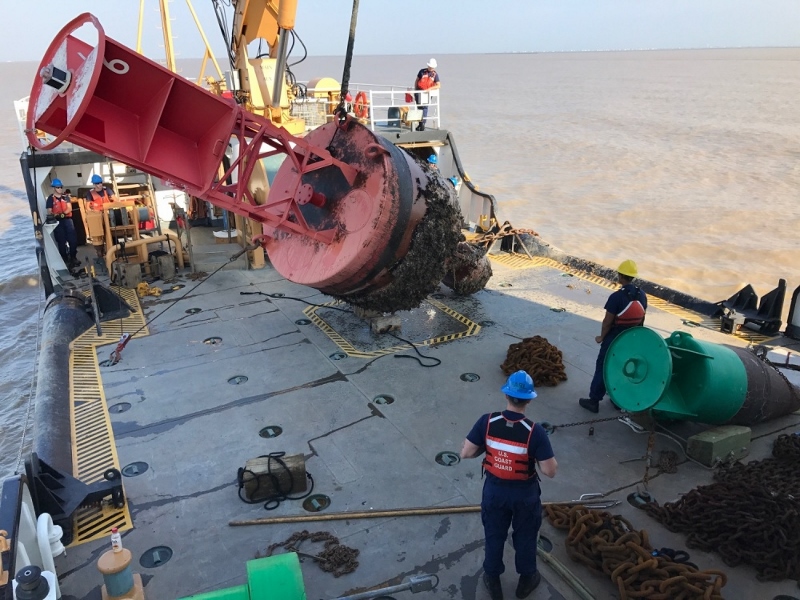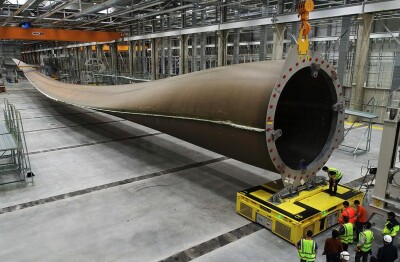Coast Guard small boat units and civilian volunteers continued to rescue thousands from flooded neighborhoods in east Texas, as forecasters warned a downgraded Tropical Depression Harvey could next threaten flash flooding for northern Mississippi, western Tennessee and Kentucky.
With 33 helicopters and 12 shallow draft flood punt boats, Coast Guard officials reported rescuing 940 around Houston by boat just on Wednesday. Rain and rising waters to the east at Port Arthur, Texas, sent more rescue teams there, as the Motiva refinery, the largest in the U.S., shut down.

Coast Guard petty officer Jacob Harris carries a child to safety during evacuations at Port Arthur, Texas. Coast Guard photo.
By early Thursday morning explosions and fires at the Arkema chemical plant in Crosby, Texas, underlined continuing risks to the vast Gulf Coast refining and chemical infrastructure from Hurricane Harvey flooding. In a statement company officials said the plant lost power and backup generation as flood waters rose to 6’.
Citing industry sources, Bloomberg reported that about 61% of U.S. ethylene production had been halted as a result of the storm, and about 51% of the manufacturing capacity for polyethylene, the ubiquitous resin used for making plastic.
As damage assessments continued in Texas ports, the 175’ Coast Guard buoy tender Harry Claiborne homeported in Galveston, Texas, inspected and repositioned buoys beset by Harvey..
Assessments and surveys by water, air and land along the ports of Houston, Texas City, Freeport and Galveston are looking for damages, potential oil spills, chemical releases, or obstructions to navigation.
“Our goal right now is to get the buoys back in place and remove all obstacles that could prevent traffic from returning to the channel,” said Coast Guard Chief Warrant Officer Jimmy Greenlee, the Clairborne’s commanding officer. “This is a crucial step toward reestablishing commerce in this area.”
An estimated 30% of U.S. gasoline refining capacity was offline, Secretary of Energy Rick Perry told reporters traveling with him and Vice President Pence Thursday. Gas prices were up an average 15% and industry analysts were predicting $2.50 gal. pricing by Labor Day for the first time in two years.
Crude oil prices recovered some ground, with the benchmark West Texas Intermediate trading up 3.2% at $47.43 Thursday. With refineries and ports closed and the continuing crude oversupply, offshore operators were gradually moving to get evacuated western Gulf platforms back into operation.
By Thursday morning 94 platforms remained evacuated, compared to 102 earlier in the week, the federal Bureau of Safety and Environmental Enforcement reported. That left an estimated 13.49% of Gulf oil production shut-in, and 17.64% of natural gas production.

A Coast Guard aids to navigation team repairs a channel marker near the Port of Corpus Christi. Coast Guard photo.
Rain continued in parts of Texas, even as a Coast Guard aids to navigation team repaired channel markers under a bluebird sky at Corpus Christi. A peak storm rainfall total of 51.88” was recorded at Cedar Bayou in Texas, and 47.35” at Beaumont/Port Arthur, according to the National Hurricane Center.
While weakening to a tropical low by the weekend, Harvey still posed the potential for 6” to 10” rains over the Mississippi, Tennessee and Ohio River valleys, with the risk of flash flooding of small streams and rivers, NHC forecasters said.





